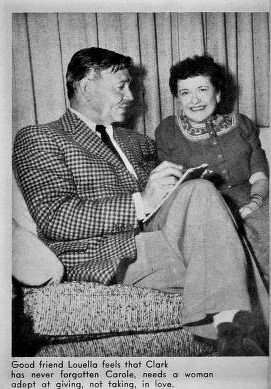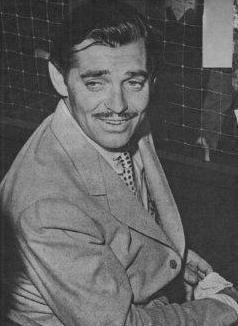{New Article} 1940: I Was Afraid of Rhett Butler
It’s no secret that Clark didn’t want the role of Rhett Butler in Gone with the Wind. Nowadays, if people do know his name, it is for that role alone–unless they are TCM fans. This article is one of many that appeared around the time GWTW was released, in which Clark tells why he didn’t want the role–too much pressure–and tries to dispel the rumor that Margaret Mitchell wrote the character of Rhett specifically with him in mind. This one’s short, so here it is in its entirety:
I Was Afraid of Rhett Butler
By Clark Gable
Liberty magazine, February 1940
Rhett Butler really put me on a spot, a hot one. Or rather Margaret Mitchell did when she created Rhett. I hope some day to have the privilege of meeting Miss Mitchell. This is partly curiosity. When a lady puts you on a spot it is only human to want to meet her. More than that, I feel we have a lot in common. Misery loves company. I can understand perfectly why she built a wall around her home. Haven’t I wanted to do the same thing during the past year? Rhett put us both on a spot. We are his innocent victims. I am certain I can speak for Miss Mitchell as well as for myself in saying that neither of us had any idea of the dent he was going to make in our lives.
Frankly I was one of the last few millions to read Gone with the Wind. When people first started talking about the book and Rhett, I wasn’t impressed. Everybody in Hollywood has the greatest story ever written. I am constantly asked to read novels, plays and originals that will make screen epics. Besides, I wasn’t interested in playing a character named “Red” Butler. It would mean dyeing my hair or wearing a wig and that’s too much to ask, even of art. Later I learned in a rather embarrassing discussion that it was Rhett, not “Red,” which punctured a good defense. What aroused my interest was a puzzling flood of letters, urging me to play Rhett, “because he was obviously written for me,” and those many friends who told me emphatically I was Rhett, and that fifty million Americans couldn’t be wrong. I read Gone with the Wind. My reaction was enthusiastic and immediate. “What a part for Ronald Colman,” I said. I was sincere.
Right here I would like to clear up a misunderstanding. The tremendous popularity of the book inspired many myths. One of these, frequently repeated, contends that Miss Mitchell had me in mind to play Rhett on the screen when she wrote her book. This is not true. She got her idea for the book and was writing it while I was a four-dollar-a-day laborer in the Oklahoma oil fields. I could have been an inspiration to no one, except possibly a soap salesman.
I cannot honestly say that I didn’t want to play Rhett, I did. But there certainly was a rub. Miss Mitchell hadn’t missed a thing. She left nothing to the imagination. Rhett was as real as life. That’s one of the things I have a desire to ask Miss Mitchell. Where did a quiet and gentle lady meet a man like Rhett Butler? Take it from me, there was a Rhett Butler and he wasn’t Clark Gable. In my travels I’ve known men like him. There was a gambler in Bigheart, Oklahoma, with long slender white fingers, who could deal faro like nobody else. He dressed and talked like a Virginia gentleman, killed a man one night, and every woman in town—but that’s another story.
Rhett was too popular, had fired the imaginations of too many people. Literally millions of people knew Rhett better than they knew George Washington. Everyone couldn’t be pleased, not even the majority. I knew that.
I might have saved myself my worrying. When the time came for the decision, I had little to do about it. David O. Selznick had purchased the screen rights and Dave was interested in making a separate deal with me, providing my studio would give me time off to make the picture for him. It was with considerable pleasure that I informed David my contract with Metro-Goldwyn-Mayer was about as iron-clad as smart lawyers could make it. And as a minor additional point, I didn’t want the part for money, marbles or chalk.
David was fair, but firm. He wanted me to know that he was going to try for a deal with MGM anyhow. I could see myself being sold down the river.
I didn’t ask the studio not to loan me. I said nothing. My contract states that I have no choice of roles. News that the deal had been agreed upon reached me during the making of Idiot’s Delight. I read it in the paper. The guillotine, I thought. I was farmed out for a percentage of the profits to Metro-Goldwyn-Mayer.
Then I lost my fear of Rhett. There were too many other things to think about. I started out with the idea of knowing Rhett as well as I know myself. I lived with him day after day, reading and rereading Gone with the Wind, underlining each sentence that revealed a facet of his many-sided character. Making the picture was comparatively easy and a pleasure. The hard work was during months of unrelenting preparation.I felt that it was essential to have Rhett so minutely pegged in my mind that it would not be necessary to think consciously about him, a direct person, extremely confident, sure of himself in any situation. A man of unrelenting will, unchangeable once he had made up his mind, polished, a gentleman, yet his own worst enemy, a mellow blending of good and bad, with a saving sense of humor.
I had no difficulty visualizing Miss Leigh as Scarlett. My thanks here are publicly expressed to Miss Leigh for making it a pleasure to believe the part of Rhett.
Scenes were not filmed in sequence, since this is not practical because of technical problems, but the book was religiously followed in its essentials. If a favorite scene is missing, you can blame the restrictions of censorship. Tut, tut, Miss Mitchell. Some dialogue and certain situations were thus eliminated but ninety per cent of the dialogue used was taken directly from the book.
Rhett always will remain among the most memorable roles I have played on the screen, although I sincerely believe that Fletcher Christian in Mutiny on the Bounty was a part of equal caliber. It was the unprecedented public interest in Rhett that made him a difficult and frightening role to tackle. Gone with the Wind belongs to the public, not Hollywood. Anyhow I’m glad it’s over. Now I can get a haircut. And I’ve got my fingers crossed.
It’s interesting he brings up Mutiny on the Bounty; he always had a fondness for that role and I do believe always held it in higher regard than GWTW–and it was another film he had to be dragged into against his will because he was afraid he couldn’t pull off the role! Clark’s Fletcher Christian is great–but I have met many a person who think of the Marlon Brando version first, unfortunately.
Also interesting is his mention of how the trade for him went down–with him reading it in the paper. It really gives you the insight of what the studio system was like–the actors were like cattle and were swapped in and out and they just said “yes sir” and collected their paychecks.
I love Gone with the Wind. I have met many people who do not, for various reasons. But I have never met anyone who said that Clark Gable was miscast as Rhett Butler. There is your reassurance, Clark.




7 Comments
Pingback:
Patti
What an interesting article! Thanks so much for posting.
GWTW is easily one of my 10 favorite movies, and Rhett is one of my favorite movie characters. Mr. Gable brought Rhett to life perfectly, and I cannot imagine anyone else (Ronald Colman included!) in that role. Clark Gable IS Rhett Butler!!
Barbara Krinsky
My best friend insisted that the role of Rhett Butler was written with Clarke Gable in Margaret Mitchell’s mind from the beginning and that’s why she wrote the book but I see that was not the case and he wasn’t even in the field of acting when she wrote it! Where else can I find proof that this is not the case so I can intelligently argue the point!
admin
Well for starters Margaret Mitchell started writing Gone with the Wind in 1926. Clark Gable was a minor stage actor then and was not a Hollywood star until 1930-1931. She would have had no way of knowing who Clark Gable was in 1926!
Lauren
Thank you for sharing this, and for making this website.
What I find interesting, is how Mr. Gable spoke of Mrs. Leigh,– was that a pure compliment, or a backhanded one?
admin
I would say pure. Unlike him to pay a backhanded compliment, especially in print!
Theresa
When I visited Margaret Mitchell’s basement apartment in Atlanta there was a reference to Rhett Butler being based on her first husband. That house/museum is full of info about the people she based her characters on. Clark Gable brought his overwhelming masculinity to the part, can you imagine if he had the southern accent Rhett would have had? Impossibly irresistible.